<< Previous | Displaying results 6301-6350 of 6773 for "" | Next >>
Prisoners march in the courtyard of the Gestapo headquarters in Nuremberg. The original caption to the photograph reads: "The courtyard of the Gestapo headquarters, Nurnberg. These appear to be Frenchmen taken to Germany as slave laborers".
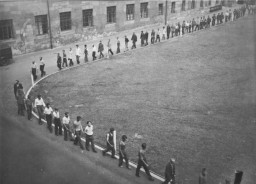
Group portrait of women and children standing outside in Warsaw before the war. Warsaw, Poland, ca. 1938.
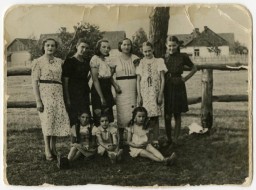
Germans in front of a Jewish-owned department store in Berlin during the anti-Jewish boycott. Berlin, Germany, April 1, 1933.
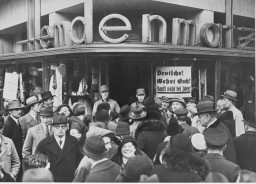
Period postcard of Evian-les-Bains, the site of the 1938 International Conference on Refugees.
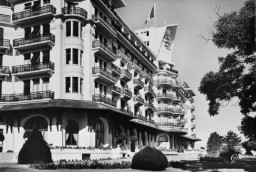
Adolf Hitler addresses an SA rally. Dortmund, Germany, 1933.
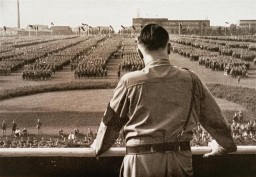
Portrait of Secretary of State Cordell Hull signing President Franklin D. Roosevelt's neutrality proclamation. September 5, 1939.
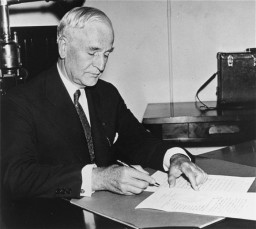
Portrait of Dr. Mohamed Helmy. Helmy was an Egyptian physician living in Berlin. He worked together with Frieda Szturmann, a local German woman, to help save a Jewish family.
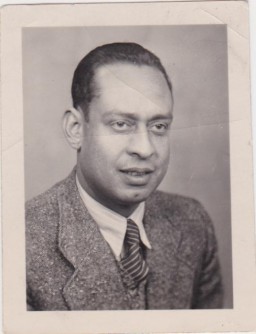
Dr. Mohamed Helmy and his wife, Emmi Ernst. During the Nazi era, they were forbidden from marrying because Dr. Helmy was not an Aryan. They were finally able to marry after the end of World War II.
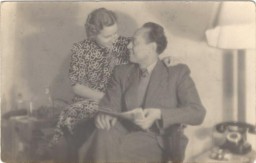
Anna Gutman (Boros) (left) and her daughter, Carla (second from left), visit with Dr. Mohamed Helmy (second from right) and his wife, Emmi (right), in Berlin in 1968. Dr. Helmy hid Gutman in his home for the duration of World War II.
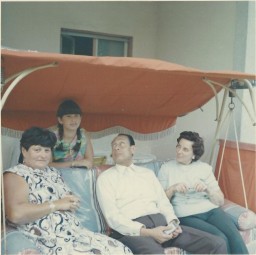
Anna Gutman (Boros) (seated, center), her daughter, and son-in-law visit Dr. Mohamed Helmy (seated, left) and his wife, Emmi (seated, right), in Berlin in 1980. Dr. Helmy hid Gutman in his home for the duration of World War II.
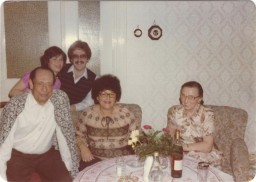
(1941-1942) Crowded newsstands in the United States such as these held journals representing various political parties and ideologies. Americans had access to many different perspectives about what was happening at home and abroad during the war.
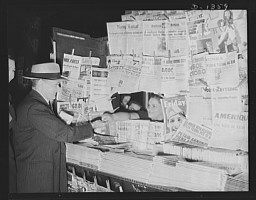
German tanks pass a burning Russian village during Operation Barbarossa, the invasion of the Soviet Union, in the summer of 1941. © IWM (HU 111382)
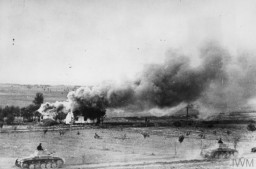
Mordecai Gebirtig, Yiddish folk poet and songwriter, was born in 1877 in Krakow, Poland. Gebirtig was confined in the Krakow ghetto in March 1942. He wrote "Our Springtime" in April 1942. The lyrics describe the bleakness and despair of ghetto life.
Yiddish folk poet and songwriter Mordecai Gebirtig was born in 1877 in Krakow, Poland. He wrote "Shifrele's Portrait" was written in Krakow in December 1939, shortly after the outbreak of World War II. Gebirtig's eldest daughter, Shifre, lived in Lvov, and was separated from her family when the Soviets annexed Lvov. In this brief song, Gebirtig, gazing at his daughter's photograph, imagines himself in conversation with her. She assures him that the war will end soon, and that parent and child will be…
Mordecai Gebirtig, born in 1877 in Krakow, Poland, was a Yiddish folk poet and songwriter. Gebirtig had three daughters, for whom he wrote and performed his poems. The words were set to improvised melodies, and most of his songs resemble entries in a diary. Many of Gebirtig's poems contain themes of eastern European Jewish life in the 1920s and 1930s. The lullaby "Your Kitten is Hungry" dates from the early 1920s. The lyrics, addressed to a hungry child, evoke the themes of hunger and deprivation.
Mordecai Gebirtig, born in 1877 in Krakow, Poland, was a Yiddish folk poet and songwriter. Gebirtig had three daughters, for whom he wrote and performed his poems. The words were set to improvised melodies, and most of his songs resemble entries in a diary. Many of Gebirtig's poems contain themes of eastern European Jewish life in the 1920s and 1930s. The lyrics to "Avreml the Pickpocket" address two social issues, crime and the collapse of family life, arguing that both find their roots in poverty and…
Mordecai Gebirtig, born in 1877 in Krakow, Poland, was a Yiddish folk poet and songwriter. Gebirtig had three daughters, for whom he wrote and performed his poems. The words were set to improvised melodies, and most of his songs resemble entries in a diary. Many of Gebirtig's poems contain themes of eastern European Jewish life in the 1920s and 1930s. The lyrics to "Rejoice, Make Merry, Children" contain a springtime motif that recurred in other Gebirtig works. In the lyrics, an elderly narrator urges…
Yiddish folk poet and songwriter Mordecai Gebirtig was born in Krakow, Poland, in 1877. "Moments of Despair" was written in Krakow in September 1940 on the first anniversary of the German invasion of Poland. The lyrics to this piece comment upon a year of persecution and the uncertainty of the future.
This piece was written in Krakow on October 2, 1940. Mordecai Gebirtig wrote this song to raise the spirits of the persecuted Jewish community in Krakow. The poet's reference to "Haman" alludes to the ancient Persian enemy of the Jewish people.
Mordecai Gebirtig, born in 1877 in Krakow, Poland, was a Yiddish folk poet and songwriter. He wrote "Undzer shtetl brent!" in 1936, following a pogrom in the Polish town of Przytyk. During the war, the song became popular in the Krakow ghetto and inspired young people to take up arms against the Nazis. It was sung in many ghettos and camps, and translated into Polish and several other languages. Gebirtig was killed in June 1942 during a roundup for deportation from the Krakow ghetto. Today, "Undzer…
Erich Frost (1900–87), a musician and devout Jehovah's Witness, was active in the religious resistance to Hitler's authority. Caught smuggling pamphlets from Switzerland to Germany, he was imprisoned in the Sachsenhausen concentration camp near Berlin where he composed this song in 1942. Later deported to a labor camp at Alderney, Channel Islands, Frost survived the war and returned to Germany to serve the Watchtower Society. "Fest steht," reworked in English as "Forward, You Witnesses," is among the…
Musician Erich Frost was a devout Jehovah's Witness active in the religious resistance to Hitler's authority. Frost was caught smuggling pamphlets from Switzerland to Germany and was deported to the Sachsenhausen concentration camp near Berlin. There, he composed this song in 1942. Frost survived the war and died in 1987. This translation is taken from the Jehovah's Witness Songbook. Simone Arnold Liebster, who sings the English version of the song, was born in 1930 in Mulhouse, French Alsace. After the…
Yiddish folk poet and songwriter Mordecai Gebirtig was born in Krakow, Poland, in 1877. In 1940, he was forced to flee from German-occupied Krakow to nearby Lagiewniki. There, in May 1941, he wrote "My Dream"—in which he dreams of peace and revenge. In March 1942 Gebirtig was forced into the Krakow ghetto, where he was killed in June 1942.
Yiddish folk poet and songwriter Mordecai Gebirtig was born in Krakow, Poland, in 1877. In 1940, he was forced to flee from German-occupied Krakow to nearby Lagiewniki. There, in October 1941, he wrote "Tolling Bells"—in which he envisions the end of persecution and occupation.
October 7, 1944. On this date, the Sonderkommando working at Crematorium IV in Auschwitz-Birkenau rose in revolt.
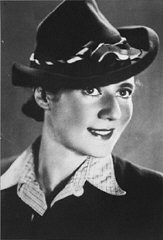
April 19, 1943. On this date, the Warsaw ghetto uprising began, the largest uprising by Jews during WWII and the first significant urban revolt against German occupation in Europe.
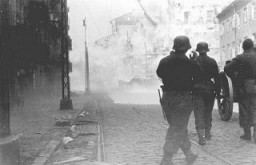
May 7, 1945. On this date, German armed forces surrendered unconditionally to Allied forces in the west.
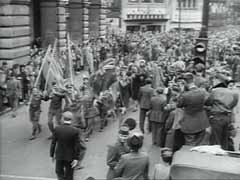
January 27, 1945. On this date, the Soviet army liberated approximately 7,000 prisoners in Auschwitz, Birkenau, and Monowitz.
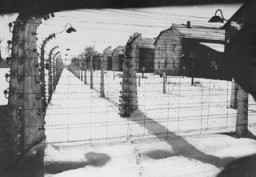
July 20, 1944. On this date, Claus Schenk von Stauffenberg and other military officers attempted to assassinate Adolf Hitler.
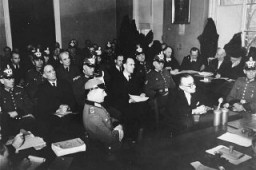
June 28, 1942. On this date, German forces attacked the Soviet Union in the south towards the city of Stalingrad.

June 9, 1942. On this date, German forces destroyed the village of Lidice as retaliation for the assassination of Reinhard Heydrich in Prague.
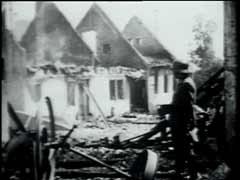
May 27, 1942. On this date, Czech agents assassinated Reinhard Heydrich in Prague.
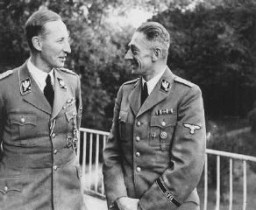
February 2, 1943. On this date, German forces surrendered at Stalingrad on the Volga in the Soviet Union.
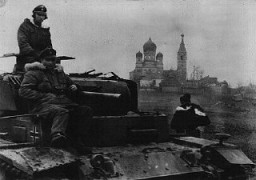
November 3, 1943. On this date, SS and police units implemented "Operation Harvest Festival" (also known as Aktion Erntefest).

March 13-16, 1943. On this date, SS and police authorities liquidated the Krakow ghetto.
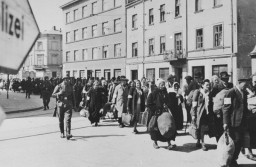
May 15-18, 1944. On this date, German authorities deported over 7,000 Jews from Theresienstadt to Auschwitz-Birkenau.

July 9, 1944. On this date, Raoul Wallenberg arrived in Budapest and began his wartime rescue efforts.
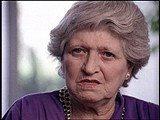
June 18-22, 1944. On this date, Rudolf Vrba and Alfred Wetzler's firsthand account of Auschwitz went public worldwide.
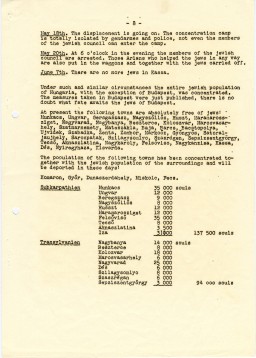
December 11, 1944. On this date, German authorities at Hartheim performed the last gassing of inmates.

April 29, 1945. On this date, US Army divisions liberated approximately 32,000 prisoners at the Dachau concentration camp.
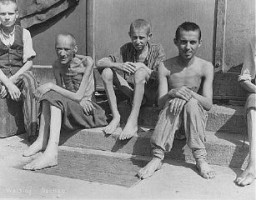
April 2, 1945. On this date, Anthony Acevedo wrote in his diary about his experience as a prisoner of war.
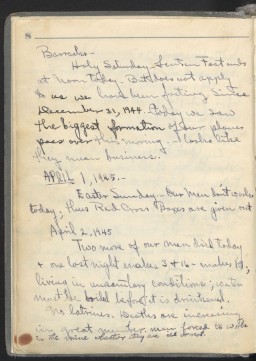
August 25, 1942. On this date, George Mandel-Mantello began issuing Salvadoran citizenship papers to Jewish refugees in Nazi-occupied Europe.
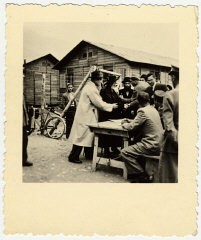
February 1, 1943. On this date, Selek and Eda Kuenstler wrote to Sophia Zendler and begged her to hide their child.
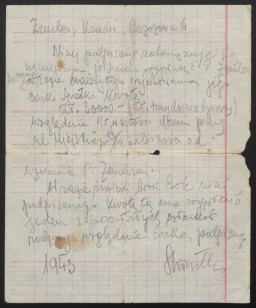
March 7, 1945. On this date, the US 9th Armored Division captured the Ludendorff Railroad Bridge at Remagen, between Koblenz and Bonn, Germany.
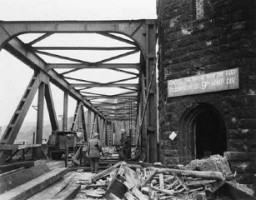
August 15, 1945. On this date, Alice Goldberger, a relief worker and Holocaust survivor, received some of the first children survivors to England
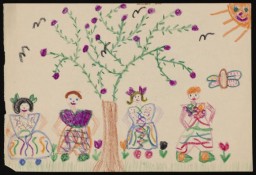
July 11, 1944. On this date, the liquidation of the "Czech family camp" in Auschwitz took place. Michael Kraus later described the event in his diary.
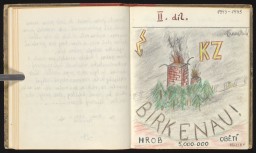
October 19-November 11, 1943. On this date, Elkhanan Elkes wrote his will. It was smuggled out of the Kovno ghetto and delivered to his children.
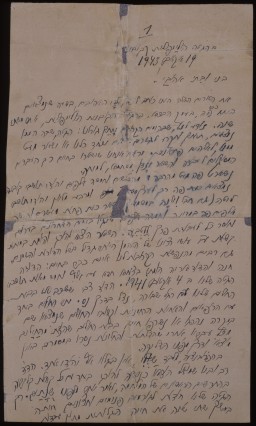
June 4, 1945. On this date, Earl G. Harrison toured displaced persons camps and wrote of his impressions of Linz, Austria.
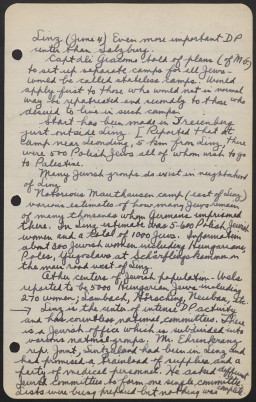
December 28, 1943. On this date, the Kohouts wrote to the commandant of Flossenbürg with a request to visit their son, a gay man who was imprisoned in the camp.
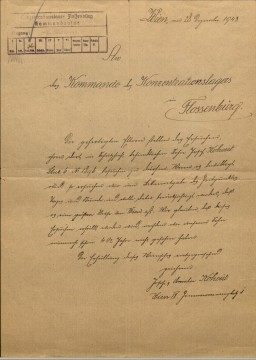
March 21, 1942. On this date, while in prison for resistance activities, Charlotte Delbo wrote to her sister. Later deported to Auschwitz, Charlotte would write about her experiences after the war.
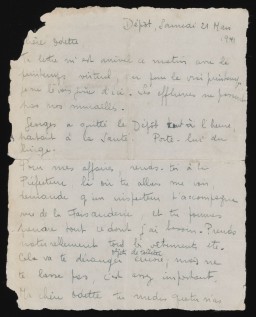
We would like to thank Crown Family Philanthropies, Abe and Ida Cooper Foundation, the Claims Conference, EVZ, and BMF for supporting the ongoing work to create content and resources for the Holocaust Encyclopedia. View the list of donor acknowledgement.